专题04Units10-12复习课件【考点串讲】-七年级英语下学期期末考点大串讲(人教版)
文档属性
| 名称 | 专题04Units10-12复习课件【考点串讲】-七年级英语下学期期末考点大串讲(人教版) |  | |
| 格式 | pptx | ||
| 文件大小 | 37.1MB | ||
| 资源类型 | 试卷 | ||
| 版本资源 | 人教新目标(Go for it)版 | ||
| 科目 | 英语 | ||
| 更新时间 | 2024-05-24 06:38:38 | ||
图片预览


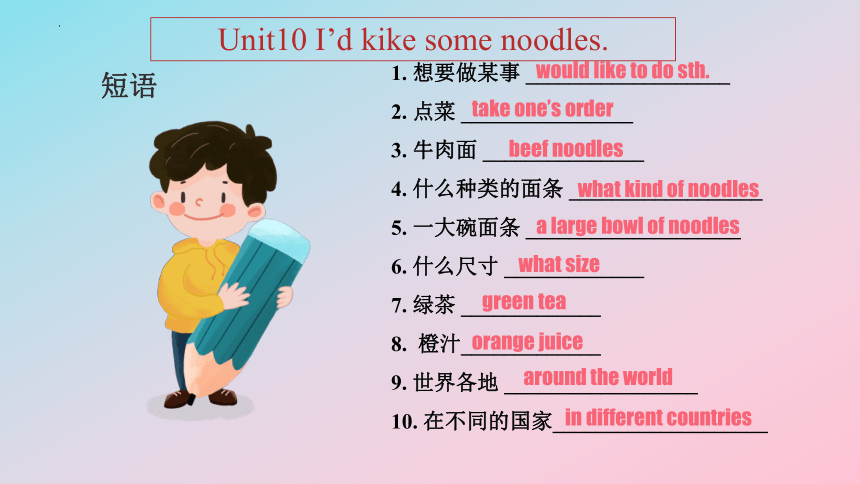
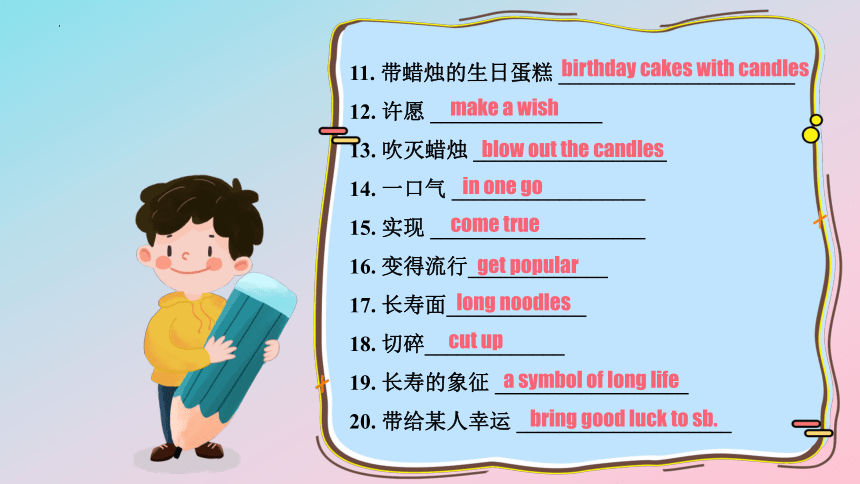

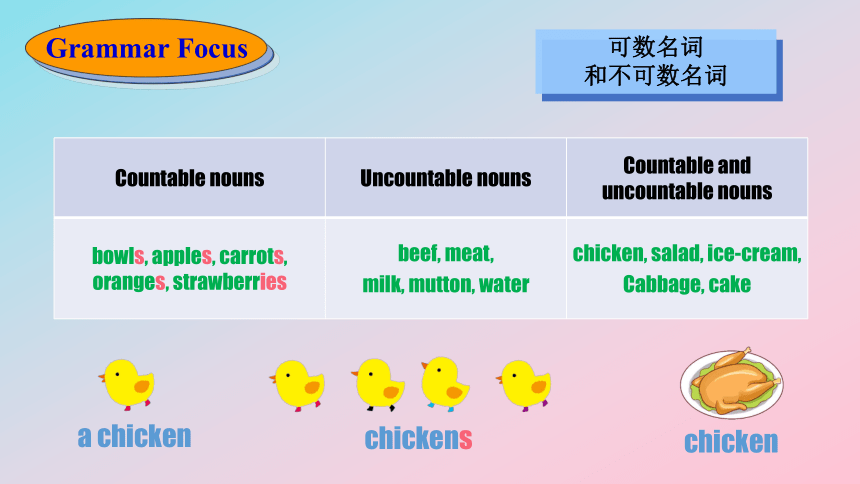
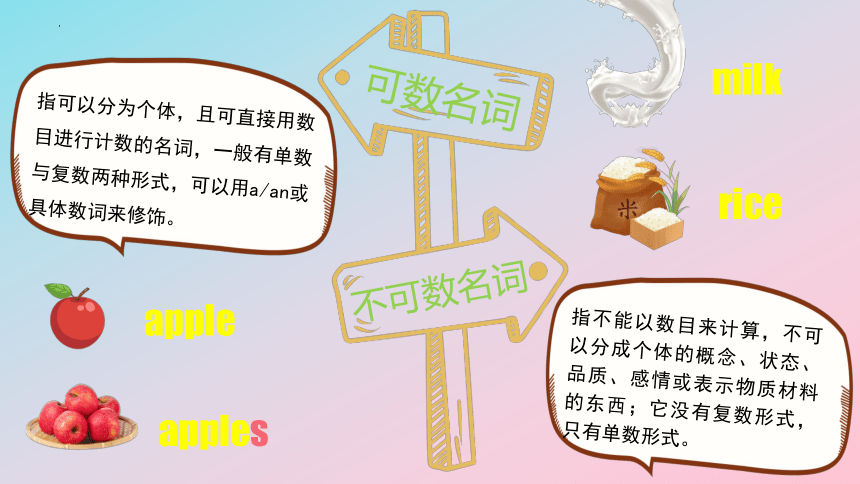
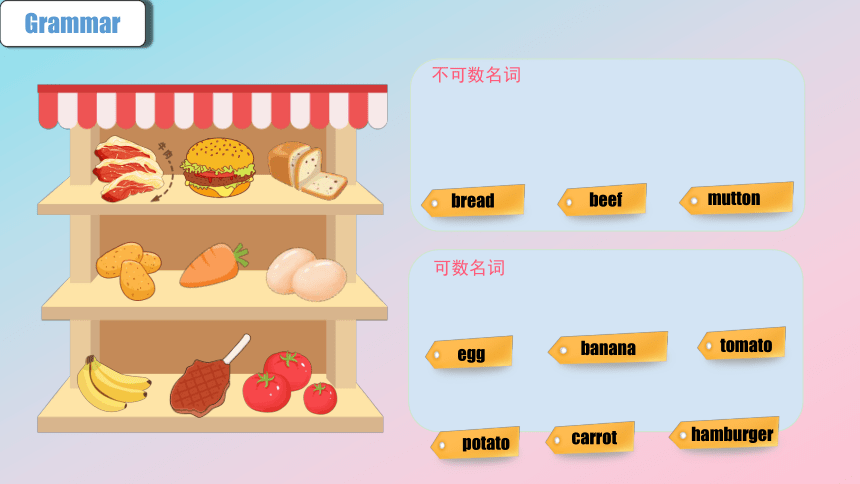
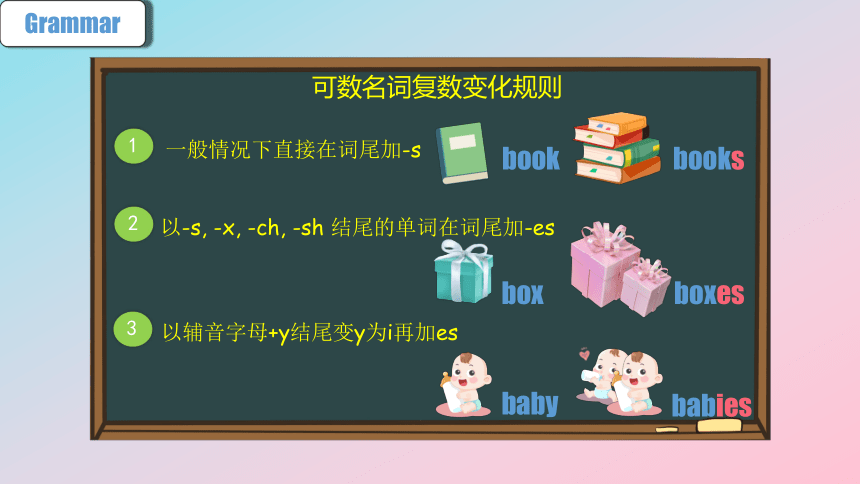
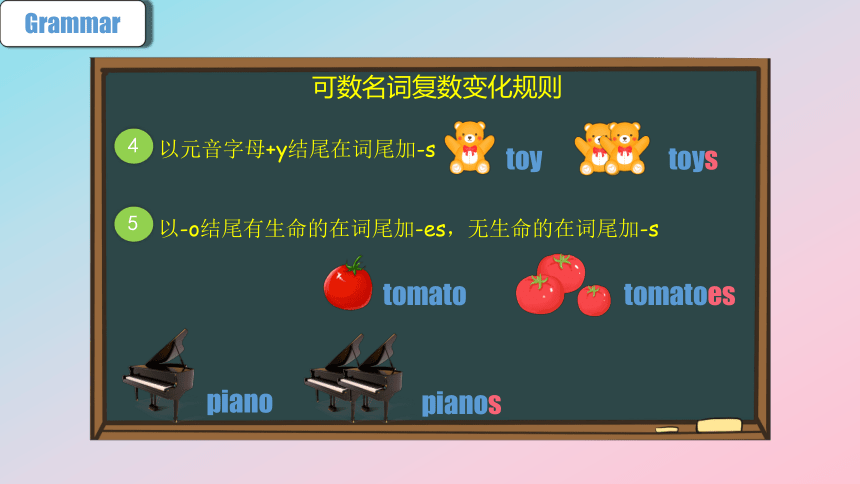
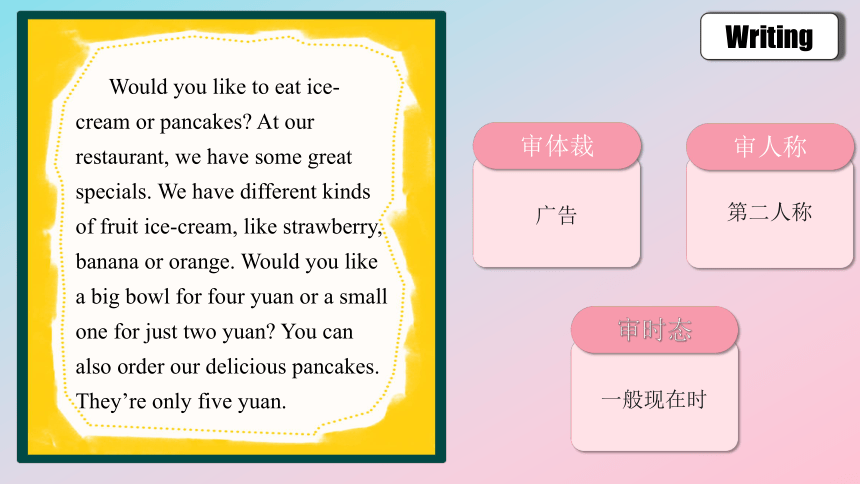
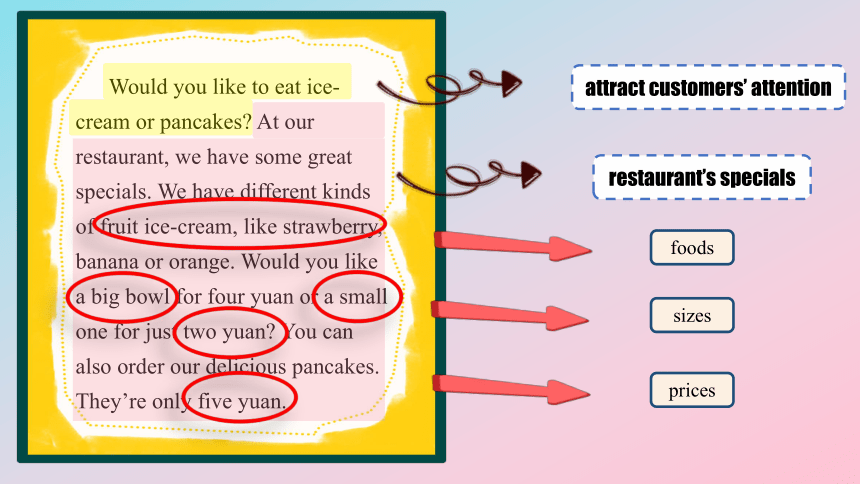
文档简介
(共43张PPT)
人教版七年级下期末考点串讲
Unit10-Unit12
目
录
CONTENT
Unit10-12 重点短语
Unit10 单元语法梳理和写作
Unit11 单元语法梳理和写作
Unit12 单元语法梳理和写作
2
3
4
1
5
Unit10-12重点语法真题感悟
1. 想要做某事 ___________________
2. 点菜 ________________
3. 牛肉面 _______________
4. 什么种类的面条 __________________
5. 一大碗面条 ____________________
6. 什么尺寸 _____________
7. 绿茶 _____________
8. 橙汁_____________
9. 世界各地 __________________
10. 在不同的国家____________________
would like to do sth.
take one’s order
beef noodles
what kind of noodles
a large bowl of noodles
what size
green tea
orange juice
around the world
in different countries
Unit10 I’d kike some noodles.
短语
11. 带蜡烛的生日蛋糕 ______________________
12. 许愿 ________________
13. 吹灭蜡烛 __________________
14. 一口气 __________________
15. 实现 ____________________
16. 变得流行_____________
17. 长寿面_____________
18. 切碎_____________
19. 长寿的象征 __________________
20. 带给某人幸运 ____________________
birthday cakes with candles
make a wish
blow out the candles
in one go
come true
get popular
long noodles
cut up
a symbol of long life
bring good luck to sb.
I’d= I would
She’d= She would
Grammar Focus
What kind of noodles would you like I’d like beef noodles, please.
What size would you like I’d like a large bowl, please.
Would you like a large bowl Yes, please.
Is there any meat in the tomato and egg soup No, there isn’t any. / No, there’s no meat.
Grammar Focus
Countable nouns Uncountable nouns Countable and uncountable nouns
bowls, apples, carrots, oranges, strawberries beef, meat, milk, mutton, water chicken, salad, ice-cream,
Cabbage, cake
chicken
chickens
a chicken
可数名词
和不可数名词
指可以分为个体,且可直接用数目进行计数的名词,一般有单数与复数两种形式,可以用a/an或具体数词来修饰。
指不能以数目来计算,不可以分成个体的概念、状态、品质、感情或表示物质材料的东西;它没有复数形式,只有单数形式。
可数名词
不可数名词
apple
apples
milk
rice
不可数名词
egg
banana
tomato
bread
potato
carrot
beef
hamburger
mutton
可数名词
Grammar
Grammar
可数名词复数变化规则
1
一般情况下直接在词尾加-s
book
books
2
以-s, -x, -ch, -sh 结尾的单词在词尾加-es
box
boxes
3
以辅音字母+y结尾变y为i再加es
baby
babies
Grammar
可数名词复数变化规则
4
以元音字母+y结尾在词尾加-s
toy
toys
5
以-o结尾有生命的在词尾加-es,无生命的在词尾加-s
tomato
tomatoes
piano
pianos
Would you like to eat ice-cream or pancakes At our restaurant, we have some great specials. We have different kinds of fruit ice-cream, like strawberry, banana or orange. Would you like a big bowl for four yuan or a small one for just two yuan You can also order our delicious pancakes. They’re only five yuan.
广告
审体裁
第二人称
审人称
一般现在时
审时态
Writing
Would you like to eat ice-cream or pancakes At our restaurant, we have some great specials. We have different kinds of fruit ice-cream, like strawberry, banana or orange. Would you like a big bowl for four yuan or a small one for just two yuan You can also order our delicious pancakes. They’re only five yuan.
attract customers’ attention
restaurant’s specials
foods
prices
sizes
Writing
Framework
Writing Framework
specials
attractive
words
Tel &
address
Welcome to …
Would you like to …
foods
prices
Our telephone number is…
Our address is…
sizes
We have…
small/medium/large
low, at a good price
school trip
go for a walk
milk a cow
ride a horse
feed chickens
talk with the farmer
take some photos
grow apples
show sb. around sp.
be interested in
1. 学校旅行 2. 去散步
3. 挤牛奶 4. 骑马
5. 喂鸡 6. 与农民交谈
7. 照相 8. 种苹果
9.带某人逛某地 10.对……感兴趣
Unit11 How was your school trip
learn a lot
pick some strawberries
last week
visit my grandparents
go fishing
go on a school trip
climb the mountains
visit a museum
come out
learn about
11. 学到许多 12. 摘草莓
13. 上周 14. 拜访我祖父母
15. 去钓鱼 16. 去旅行
17. 去爬山 18. 参观博物馆
19.出来 20.了解
一 般 过 去 时
句型结构
动词过去式
变化规则
用法&
时间状语
一 般 过 去 时
用法 & 时间状语
一般过去时表示过去某个时间发生的动作或存在的状态,常和表示过去的时间状语连用。如 yesterday,a moment ago(刚才),yesterday morning, last night/week,the day before yesterday(前天),just now(刚才),in+过去的时间(in 1980)等。
一 般 过 去 时
动词过去式变化规则
一般的动词 直接加-ed play-playedwant-wanted
以字母e结尾的动词 直接加-d hope-hoped live-lived
以辅音字母加y结尾的动词 变y为i,再加-ed先双写 study--studied worry -worried
重读闭音节结尾的动词,末尾只有一个辅音字母 这个辅音字母,再加-ed stop-stopped shop-shopped
<规则变化>
不规则动词的过去式变化各异,没有统一的规则,但也并非一点规律没有,下面介绍一部分动词过去式的记忆规律。
①动词过去式与动词原形一样。如:let->let,put-put,cut->cut。
②遇见i改为a。如:swim-swam,sing-sang,begin-began。
③过去式以ought和aught结尾的单词,如:bring brought,buy-bought,think thought, teach -taught.
④中间去e末尾加t,如:feel-felt,keep kept,sleep-slept, sweep-swept, meet-met.
⑤把i変为o,如:ride -rode,drive -drove, write -wrote。
⑥ow/aw变为ew,如:know-knew,grow-grew,throw-threw。
⑦以d结尾的词,把d变成l,如:build-built,lend-lent,send-sent,spend-spent。
⑧be动词的过去式有两种形式,主语是第一、三人称单数形式用 was,其他人称用 were。
<不规则变化>
动词过去式变化规则——不规则变化
动词原形 过去式 过去分词
cost(花费)
cut(切) read(读) run(跑)
become(变成) build(建立)
win(赢) feed(喂养) take(拿)
eat(吃) cost
cost
cut
cut
read
read
AAA型
ran
run
became
built
built
won
won
fed
fed
took
taken
ate
eaten
become
ABA型
ABB型
ABC型
一 般 过 去 时
句型结构
(1) 含be动词的一般过去时的句式
①肯定句主语+was/were十其他.Our school trip was terrible last week,我们上周的学校旅行很糟糕
②否定句:主语+was not(wasn't)/were not(weren't)十其他.I wasn't at home yesterday.昨天我不在家。
③一般疑问句为“Was/Were十主语十其他 ”。
肯定回答常用“Yes,主语+was/were. 否定回答常用“No,主语+wasn't/weren't.”
-Were you at home yesterday 昨天你在家吗 -No,I wasn't.不,我不在家
④特殊疑问句:疑问词十was/were十主语十其他 How was your school trip
你的学校旅行怎么样
一 般 过 去 时
句型结构
①肯定句:主语十动词过去式十其他.They had a good time yesterday.他们昨天玩得很开心。
②否定句:主语+did not/didn't十动词原形十其他.They didn't watch TV last nigh1.昨天晚上他们没有看电视。
③一般疑问句为“Did+主语十动词原形十其他 ”。肯定回答常用“Yes,主语+did,” 否定回答常用“No,主语+didn't.”
④特殊疑问句:疑问词+did+主语十动词原形十其他 What time did you finish your homework 你是什么时候做完家庭作业的
(2) 含实义动词的一般过去时的句式
写
作
要
求
Today I went on aschool trip. 今 天我进行了一次学校郊游。
I think today’s school trip was terrible. 我认为今天的学校郊游很糟糕。
We took the train to the museum. 我们乘火车去博物馆
We visited the science museum and it was very interesting.我初中英语大讲堂们参观了科学博物馆,那真的很有趣。
I went to the gift shop and bought some lovely gifts formy parents.我去了礼品店给我父母买了一些可爱的礼物。
They weren’t expensive.它们不贵。
Al in all,it was an exciting day.总的来说,这是激动人心的一天
话题分析
本单元以学校旅行为话题,主要描述旅行期间所发生的事情及感受。此类文章以记叙文为主要说明事情的时间、地点、人物、经过和结果,同时要注意一般过去时的正确使用。
素材积累
实
战
演
练
写一篇关于妮上一次学校旅行的日记,叙述学校旅行的活动,并对自己的活动做出简单评价,注意:语言通顺、意思连贯、书写规范。日记内容应该包括下面六个问题。
Who did you go with Where did you visit
When did you go there How did you go there
What did you do How was the weather
My School Trip
Time
Beginning(开头)
Body(正文)
Ending(结尾)
place
transportation
feeling
activities1,2,3.
It was a great/ boring trip.
June 23rd
I went on a trip last weekend. It was very exciting.
I went to a park with my friends. The weather was sunny and cool. We went there by bike. We saw some farms along the way. I climbed the mountains and took some great photos. At noon, I had lunch in the park.The food was expensive in the park. The people were friendly.
I really enjoyed in the park.
Unit 12
What did you do last weekend
1. 去看电影
2. 去划船
3. 湖边露营
4. 打羽毛球
5. 复习备考
6. 作为一名导游
7. 有点儿
8. 熬夜;深夜不睡
9. 朝……吼叫(愤怒)
10. 跑开
Phrases
go to the cinema
go boating
camp by the lake
play badminton
study for a test
as a guide
kind of
stay up late
shout at
run away
1. 放风筝
2. 高中毕业
3. 作为一份特别的礼物
4. 带……去……
5. 去野营
6. 搭起;举起
7. 生火
8. 让我们保暖
9. 吃惊
10. 对……大喊
11. 上上下下
Phrases
fly a kite
finish high school
as a special gift
take ... to...
go camping
put up
make a fire
keep us warm
get a surprise
shout to
up and down
What did you do last weekend I did my homework.
We went boating.
Who visited her grandma Becky did.
Where did she go last weekend She went to a farm.
Who did she go with She went with her classmates.
观察课本69页语法表格,归纳一般过去时特殊疑问句的句式。
一般过去时特殊疑问句:
特殊疑问词 + did + 主语 + 动词原形 + 其他?
思考:所有的一般过去时特殊疑问句
都有助动词did吗?
1. 当特殊疑问词不是主语时:
特殊疑问词 + did + 主语 + 动词原形 + 其他?
特殊疑问词 + was / were + 主语 + 其他?
Who did you go to the cinema with
Where were you last night
2. 当特殊疑问词是主语时:
特殊疑问词 + 动词过去式 + 其他?
特殊疑问词 + was / were + 其他?
Who cleaned the blackboard
What was wrong with your computer
Did you have an unforgettable weekend
1
2
3
4
5
when
where
who
what
how
How to write a passage about your weekend
Activities
feelings
the order of time
From Saturday to Sunday
From morning to night
Beginning
Body
Ending
I had a … weekend.
What did I do this weekend I will tell you…
Last weekend was…
Places
This is my … weekend.
I think my weekend …
How about your weekend
Sample writing
I had a great weekend.On Saturday morning,I went for a trip with my classmates in the countryside.We rode horses.It was exciting.And we also saw a lot of flowers along the way.After lunch,we took boats in a big lake.On Saturday evening,we got back by bus.
On Sunday morning,I did my homework and studied for the English test.In the afternoon,I exercised.It made me a little tired,so I went to bed early on Sunday night.All in all, I like my weekends.
真题感悟
1.(22-23七年级下·新疆乌鲁木齐·期末)My mother had a little ________ this morning.
A.tomatoes B.noodles C.rice D.potato
【答案】C
【详解】句意:我妈妈今天早上吃了一点米饭。
考查名词的数。tomatoes西红柿,可数名词复数;noodles面条,可数名词复数; rice米饭,不可数名词; potato土豆,可数名词单数。a little+不可数名词。故选C。
2.(22-23七年级上·重庆沙坪坝·期末)Tom has many ________ for breakfast this morning.
A.chicken B.bread C.fruit D.carrots
【答案】D
【详解】句意:汤姆今天早餐吃了很多胡萝卜。
考查名词辨析。chicken鸡肉,不可数名词;bread面包,不可数名词;fruit水果,不可数名词;carrots胡萝卜,复数名词。根据“many”后接复数名词可知,只有carrots符合题意。故选D。
真题感悟
3.(22-23七年级下·山东滨州·期末)There isn’t ________ milk in the fridge. Let’s buy ________ again.
A.some; some B.some; any C.any; any D.any; some
【答案】D
【详解】句意:冰箱里没有牛奶。让我们再买一些。
考查代词辨析。some一些,用于肯定句;any任何,用于疑问句和否定句。第一空所在句子是否定句,所以第一空填any。第二空所在句子是肯定句,所以第二空填some,故选D。
真题感悟
4.(21-22七年级下·山东滨州·期末)— What would you like to have
— How about some ________ They’re healthy vegetables.
A.potatoes B.cakes C.apples D.dumplings
【答案】A
【详解】句意:——你想吃点什么?——一些土豆怎么样?它们是健康的蔬菜。
考查名词词义辨析。potatoes土豆;cakes蛋糕;apples苹果;dumplings饺子。由“healthy vegetables”可知,土豆是蔬菜。故选A。
真题感悟
5.(2023·辽宁朝阳·中考真题)—What did you do last weekend
—I ________ to the movies with my friends.
A.will go B.go C.goes D.went
【答案】D
【详解】句意:——你上周末做了什么?——我和朋友去看电影了。
考查时态。根据“last weekend”可知,是一般过去时,故选D。
6.(2023·黑龙江绥化·中考真题)— How did you get to school yesterday
— I ________ my bike to school.
A.rode B.ride C.rides
【答案】A
【详解】句意:——你昨天是怎么到学校的?——我骑自行车去学校。
考查时态。根据“How did you...”可知句子用一般过去时,动词用过去式。故选A。
真题感悟
7.(2023·广西·中考真题)Yesterday I ________ basketball with my classmates. We had a good time.
A.will play B.play C.played
【答案】C
【详解】句意:昨天我和我的同学打篮球。我们玩得很开心。考查时态。根据“Yesterday”可知,时态是一般过去时,故选C。
8.(2022·辽宁丹东·中考真题)— Who locked the door yesterday
— ________.
A.I do B.I will C.I did D.I can
【答案】C
【详解】句意:——昨天谁锁门了?——我锁了。考查一般过去时。I do我做的/我愿意,用于一般现在时;I will我会的,用于一般将来时;I did我做的,用于一般过去时;I can我可以,用于一般现在时。根据问句“Who locked the door yesterday ”可知询问的是过去的事情,因此回答也应用一般过去时。故选C。
真题感悟
9.(2022·吉林·中考真题)—Helen, why didn’t you come to the party yesterday
—Oh, I ________ for the speech competition.
A.prepares B.prepared C.will prepare
【答案】B
【详解】句意:——Helen,你昨天为什么没有来参加派对?——哦,我在准备演讲比赛。考查动词时态。根据问句“didn’t”可知,答语用一般过去时,动词用过去式,故选B。
10.(2022·湖北·中考真题)Li Lei ________ the school bus last Friday.
A.misses B.missed C.was missing D.has missed
【答案】B
【详解】句意:李雷上周五错过了校车。考查一般过去时。根据时间状语“last Friday”可知,本句是一般过去时,动词用过去式missed。故选B。
真题感悟
11.(2022·辽宁阜新·中考真题)China ________ nine gold medals at the Beijing 2022 Winter Olympics.
A.wins B.is winning C.won D.will win
【答案】C
【详解】句意:中国在2022年北京冬奥会赢得了9枚金牌。
考查时态。根据“...at the Beijing 2022 Winter Olympics.”可知此处指发生过的事情,用一般过去时。故选C。
真题感悟
12.(2021·四川雅安·中考真题)—What did you do last summer holiday, Becky.
—I ________ as a volunteer at the Natural History Museum.
A.will work B.worked C.am working D.work
【答案】B
【详解】句意:——Becky, 你去年暑假做了什么? ——我在自然历史博物馆当过志愿者。
考查动词时态。work是动词,意为“工作” 根据时间状语“last summer holiday”表动作发生在过去,因此设空处应用一般过去时态。即worked符合语境。故选B。
人教版七年级下期末考点串讲
Unit10-Unit12
目
录
CONTENT
Unit10-12 重点短语
Unit10 单元语法梳理和写作
Unit11 单元语法梳理和写作
Unit12 单元语法梳理和写作
2
3
4
1
5
Unit10-12重点语法真题感悟
1. 想要做某事 ___________________
2. 点菜 ________________
3. 牛肉面 _______________
4. 什么种类的面条 __________________
5. 一大碗面条 ____________________
6. 什么尺寸 _____________
7. 绿茶 _____________
8. 橙汁_____________
9. 世界各地 __________________
10. 在不同的国家____________________
would like to do sth.
take one’s order
beef noodles
what kind of noodles
a large bowl of noodles
what size
green tea
orange juice
around the world
in different countries
Unit10 I’d kike some noodles.
短语
11. 带蜡烛的生日蛋糕 ______________________
12. 许愿 ________________
13. 吹灭蜡烛 __________________
14. 一口气 __________________
15. 实现 ____________________
16. 变得流行_____________
17. 长寿面_____________
18. 切碎_____________
19. 长寿的象征 __________________
20. 带给某人幸运 ____________________
birthday cakes with candles
make a wish
blow out the candles
in one go
come true
get popular
long noodles
cut up
a symbol of long life
bring good luck to sb.
I’d= I would
She’d= She would
Grammar Focus
What kind of noodles would you like I’d like beef noodles, please.
What size would you like I’d like a large bowl, please.
Would you like a large bowl Yes, please.
Is there any meat in the tomato and egg soup No, there isn’t any. / No, there’s no meat.
Grammar Focus
Countable nouns Uncountable nouns Countable and uncountable nouns
bowls, apples, carrots, oranges, strawberries beef, meat, milk, mutton, water chicken, salad, ice-cream,
Cabbage, cake
chicken
chickens
a chicken
可数名词
和不可数名词
指可以分为个体,且可直接用数目进行计数的名词,一般有单数与复数两种形式,可以用a/an或具体数词来修饰。
指不能以数目来计算,不可以分成个体的概念、状态、品质、感情或表示物质材料的东西;它没有复数形式,只有单数形式。
可数名词
不可数名词
apple
apples
milk
rice
不可数名词
egg
banana
tomato
bread
potato
carrot
beef
hamburger
mutton
可数名词
Grammar
Grammar
可数名词复数变化规则
1
一般情况下直接在词尾加-s
book
books
2
以-s, -x, -ch, -sh 结尾的单词在词尾加-es
box
boxes
3
以辅音字母+y结尾变y为i再加es
baby
babies
Grammar
可数名词复数变化规则
4
以元音字母+y结尾在词尾加-s
toy
toys
5
以-o结尾有生命的在词尾加-es,无生命的在词尾加-s
tomato
tomatoes
piano
pianos
Would you like to eat ice-cream or pancakes At our restaurant, we have some great specials. We have different kinds of fruit ice-cream, like strawberry, banana or orange. Would you like a big bowl for four yuan or a small one for just two yuan You can also order our delicious pancakes. They’re only five yuan.
广告
审体裁
第二人称
审人称
一般现在时
审时态
Writing
Would you like to eat ice-cream or pancakes At our restaurant, we have some great specials. We have different kinds of fruit ice-cream, like strawberry, banana or orange. Would you like a big bowl for four yuan or a small one for just two yuan You can also order our delicious pancakes. They’re only five yuan.
attract customers’ attention
restaurant’s specials
foods
prices
sizes
Writing
Framework
Writing Framework
specials
attractive
words
Tel &
address
Welcome to …
Would you like to …
foods
prices
Our telephone number is…
Our address is…
sizes
We have…
small/medium/large
low, at a good price
school trip
go for a walk
milk a cow
ride a horse
feed chickens
talk with the farmer
take some photos
grow apples
show sb. around sp.
be interested in
1. 学校旅行 2. 去散步
3. 挤牛奶 4. 骑马
5. 喂鸡 6. 与农民交谈
7. 照相 8. 种苹果
9.带某人逛某地 10.对……感兴趣
Unit11 How was your school trip
learn a lot
pick some strawberries
last week
visit my grandparents
go fishing
go on a school trip
climb the mountains
visit a museum
come out
learn about
11. 学到许多 12. 摘草莓
13. 上周 14. 拜访我祖父母
15. 去钓鱼 16. 去旅行
17. 去爬山 18. 参观博物馆
19.出来 20.了解
一 般 过 去 时
句型结构
动词过去式
变化规则
用法&
时间状语
一 般 过 去 时
用法 & 时间状语
一般过去时表示过去某个时间发生的动作或存在的状态,常和表示过去的时间状语连用。如 yesterday,a moment ago(刚才),yesterday morning, last night/week,the day before yesterday(前天),just now(刚才),in+过去的时间(in 1980)等。
一 般 过 去 时
动词过去式变化规则
一般的动词 直接加-ed play-playedwant-wanted
以字母e结尾的动词 直接加-d hope-hoped live-lived
以辅音字母加y结尾的动词 变y为i,再加-ed先双写 study--studied worry -worried
重读闭音节结尾的动词,末尾只有一个辅音字母 这个辅音字母,再加-ed stop-stopped shop-shopped
<规则变化>
不规则动词的过去式变化各异,没有统一的规则,但也并非一点规律没有,下面介绍一部分动词过去式的记忆规律。
①动词过去式与动词原形一样。如:let->let,put-put,cut->cut。
②遇见i改为a。如:swim-swam,sing-sang,begin-began。
③过去式以ought和aught结尾的单词,如:bring brought,buy-bought,think thought, teach -taught.
④中间去e末尾加t,如:feel-felt,keep kept,sleep-slept, sweep-swept, meet-met.
⑤把i変为o,如:ride -rode,drive -drove, write -wrote。
⑥ow/aw变为ew,如:know-knew,grow-grew,throw-threw。
⑦以d结尾的词,把d变成l,如:build-built,lend-lent,send-sent,spend-spent。
⑧be动词的过去式有两种形式,主语是第一、三人称单数形式用 was,其他人称用 were。
<不规则变化>
动词过去式变化规则——不规则变化
动词原形 过去式 过去分词
cost(花费)
cut(切) read(读) run(跑)
become(变成) build(建立)
win(赢) feed(喂养) take(拿)
eat(吃) cost
cost
cut
cut
read
read
AAA型
ran
run
became
built
built
won
won
fed
fed
took
taken
ate
eaten
become
ABA型
ABB型
ABC型
一 般 过 去 时
句型结构
(1) 含be动词的一般过去时的句式
①肯定句主语+was/were十其他.Our school trip was terrible last week,我们上周的学校旅行很糟糕
②否定句:主语+was not(wasn't)/were not(weren't)十其他.I wasn't at home yesterday.昨天我不在家。
③一般疑问句为“Was/Were十主语十其他 ”。
肯定回答常用“Yes,主语+was/were. 否定回答常用“No,主语+wasn't/weren't.”
-Were you at home yesterday 昨天你在家吗 -No,I wasn't.不,我不在家
④特殊疑问句:疑问词十was/were十主语十其他 How was your school trip
你的学校旅行怎么样
一 般 过 去 时
句型结构
①肯定句:主语十动词过去式十其他.They had a good time yesterday.他们昨天玩得很开心。
②否定句:主语+did not/didn't十动词原形十其他.They didn't watch TV last nigh1.昨天晚上他们没有看电视。
③一般疑问句为“Did+主语十动词原形十其他 ”。肯定回答常用“Yes,主语+did,” 否定回答常用“No,主语+didn't.”
④特殊疑问句:疑问词+did+主语十动词原形十其他 What time did you finish your homework 你是什么时候做完家庭作业的
(2) 含实义动词的一般过去时的句式
写
作
要
求
Today I went on aschool trip. 今 天我进行了一次学校郊游。
I think today’s school trip was terrible. 我认为今天的学校郊游很糟糕。
We took the train to the museum. 我们乘火车去博物馆
We visited the science museum and it was very interesting.我初中英语大讲堂们参观了科学博物馆,那真的很有趣。
I went to the gift shop and bought some lovely gifts formy parents.我去了礼品店给我父母买了一些可爱的礼物。
They weren’t expensive.它们不贵。
Al in all,it was an exciting day.总的来说,这是激动人心的一天
话题分析
本单元以学校旅行为话题,主要描述旅行期间所发生的事情及感受。此类文章以记叙文为主要说明事情的时间、地点、人物、经过和结果,同时要注意一般过去时的正确使用。
素材积累
实
战
演
练
写一篇关于妮上一次学校旅行的日记,叙述学校旅行的活动,并对自己的活动做出简单评价,注意:语言通顺、意思连贯、书写规范。日记内容应该包括下面六个问题。
Who did you go with Where did you visit
When did you go there How did you go there
What did you do How was the weather
My School Trip
Time
Beginning(开头)
Body(正文)
Ending(结尾)
place
transportation
feeling
activities1,2,3.
It was a great/ boring trip.
June 23rd
I went on a trip last weekend. It was very exciting.
I went to a park with my friends. The weather was sunny and cool. We went there by bike. We saw some farms along the way. I climbed the mountains and took some great photos. At noon, I had lunch in the park.The food was expensive in the park. The people were friendly.
I really enjoyed in the park.
Unit 12
What did you do last weekend
1. 去看电影
2. 去划船
3. 湖边露营
4. 打羽毛球
5. 复习备考
6. 作为一名导游
7. 有点儿
8. 熬夜;深夜不睡
9. 朝……吼叫(愤怒)
10. 跑开
Phrases
go to the cinema
go boating
camp by the lake
play badminton
study for a test
as a guide
kind of
stay up late
shout at
run away
1. 放风筝
2. 高中毕业
3. 作为一份特别的礼物
4. 带……去……
5. 去野营
6. 搭起;举起
7. 生火
8. 让我们保暖
9. 吃惊
10. 对……大喊
11. 上上下下
Phrases
fly a kite
finish high school
as a special gift
take ... to...
go camping
put up
make a fire
keep us warm
get a surprise
shout to
up and down
What did you do last weekend I did my homework.
We went boating.
Who visited her grandma Becky did.
Where did she go last weekend She went to a farm.
Who did she go with She went with her classmates.
观察课本69页语法表格,归纳一般过去时特殊疑问句的句式。
一般过去时特殊疑问句:
特殊疑问词 + did + 主语 + 动词原形 + 其他?
思考:所有的一般过去时特殊疑问句
都有助动词did吗?
1. 当特殊疑问词不是主语时:
特殊疑问词 + did + 主语 + 动词原形 + 其他?
特殊疑问词 + was / were + 主语 + 其他?
Who did you go to the cinema with
Where were you last night
2. 当特殊疑问词是主语时:
特殊疑问词 + 动词过去式 + 其他?
特殊疑问词 + was / were + 其他?
Who cleaned the blackboard
What was wrong with your computer
Did you have an unforgettable weekend
1
2
3
4
5
when
where
who
what
how
How to write a passage about your weekend
Activities
feelings
the order of time
From Saturday to Sunday
From morning to night
Beginning
Body
Ending
I had a … weekend.
What did I do this weekend I will tell you…
Last weekend was…
Places
This is my … weekend.
I think my weekend …
How about your weekend
Sample writing
I had a great weekend.On Saturday morning,I went for a trip with my classmates in the countryside.We rode horses.It was exciting.And we also saw a lot of flowers along the way.After lunch,we took boats in a big lake.On Saturday evening,we got back by bus.
On Sunday morning,I did my homework and studied for the English test.In the afternoon,I exercised.It made me a little tired,so I went to bed early on Sunday night.All in all, I like my weekends.
真题感悟
1.(22-23七年级下·新疆乌鲁木齐·期末)My mother had a little ________ this morning.
A.tomatoes B.noodles C.rice D.potato
【答案】C
【详解】句意:我妈妈今天早上吃了一点米饭。
考查名词的数。tomatoes西红柿,可数名词复数;noodles面条,可数名词复数; rice米饭,不可数名词; potato土豆,可数名词单数。a little+不可数名词。故选C。
2.(22-23七年级上·重庆沙坪坝·期末)Tom has many ________ for breakfast this morning.
A.chicken B.bread C.fruit D.carrots
【答案】D
【详解】句意:汤姆今天早餐吃了很多胡萝卜。
考查名词辨析。chicken鸡肉,不可数名词;bread面包,不可数名词;fruit水果,不可数名词;carrots胡萝卜,复数名词。根据“many”后接复数名词可知,只有carrots符合题意。故选D。
真题感悟
3.(22-23七年级下·山东滨州·期末)There isn’t ________ milk in the fridge. Let’s buy ________ again.
A.some; some B.some; any C.any; any D.any; some
【答案】D
【详解】句意:冰箱里没有牛奶。让我们再买一些。
考查代词辨析。some一些,用于肯定句;any任何,用于疑问句和否定句。第一空所在句子是否定句,所以第一空填any。第二空所在句子是肯定句,所以第二空填some,故选D。
真题感悟
4.(21-22七年级下·山东滨州·期末)— What would you like to have
— How about some ________ They’re healthy vegetables.
A.potatoes B.cakes C.apples D.dumplings
【答案】A
【详解】句意:——你想吃点什么?——一些土豆怎么样?它们是健康的蔬菜。
考查名词词义辨析。potatoes土豆;cakes蛋糕;apples苹果;dumplings饺子。由“healthy vegetables”可知,土豆是蔬菜。故选A。
真题感悟
5.(2023·辽宁朝阳·中考真题)—What did you do last weekend
—I ________ to the movies with my friends.
A.will go B.go C.goes D.went
【答案】D
【详解】句意:——你上周末做了什么?——我和朋友去看电影了。
考查时态。根据“last weekend”可知,是一般过去时,故选D。
6.(2023·黑龙江绥化·中考真题)— How did you get to school yesterday
— I ________ my bike to school.
A.rode B.ride C.rides
【答案】A
【详解】句意:——你昨天是怎么到学校的?——我骑自行车去学校。
考查时态。根据“How did you...”可知句子用一般过去时,动词用过去式。故选A。
真题感悟
7.(2023·广西·中考真题)Yesterday I ________ basketball with my classmates. We had a good time.
A.will play B.play C.played
【答案】C
【详解】句意:昨天我和我的同学打篮球。我们玩得很开心。考查时态。根据“Yesterday”可知,时态是一般过去时,故选C。
8.(2022·辽宁丹东·中考真题)— Who locked the door yesterday
— ________.
A.I do B.I will C.I did D.I can
【答案】C
【详解】句意:——昨天谁锁门了?——我锁了。考查一般过去时。I do我做的/我愿意,用于一般现在时;I will我会的,用于一般将来时;I did我做的,用于一般过去时;I can我可以,用于一般现在时。根据问句“Who locked the door yesterday ”可知询问的是过去的事情,因此回答也应用一般过去时。故选C。
真题感悟
9.(2022·吉林·中考真题)—Helen, why didn’t you come to the party yesterday
—Oh, I ________ for the speech competition.
A.prepares B.prepared C.will prepare
【答案】B
【详解】句意:——Helen,你昨天为什么没有来参加派对?——哦,我在准备演讲比赛。考查动词时态。根据问句“didn’t”可知,答语用一般过去时,动词用过去式,故选B。
10.(2022·湖北·中考真题)Li Lei ________ the school bus last Friday.
A.misses B.missed C.was missing D.has missed
【答案】B
【详解】句意:李雷上周五错过了校车。考查一般过去时。根据时间状语“last Friday”可知,本句是一般过去时,动词用过去式missed。故选B。
真题感悟
11.(2022·辽宁阜新·中考真题)China ________ nine gold medals at the Beijing 2022 Winter Olympics.
A.wins B.is winning C.won D.will win
【答案】C
【详解】句意:中国在2022年北京冬奥会赢得了9枚金牌。
考查时态。根据“...at the Beijing 2022 Winter Olympics.”可知此处指发生过的事情,用一般过去时。故选C。
真题感悟
12.(2021·四川雅安·中考真题)—What did you do last summer holiday, Becky.
—I ________ as a volunteer at the Natural History Museum.
A.will work B.worked C.am working D.work
【答案】B
【详解】句意:——Becky, 你去年暑假做了什么? ——我在自然历史博物馆当过志愿者。
考查动词时态。work是动词,意为“工作” 根据时间状语“last summer holiday”表动作发生在过去,因此设空处应用一般过去时态。即worked符合语境。故选B。
同课章节目录
